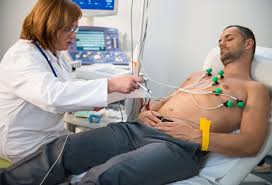When it comes to your heart, even small symptoms should never be ignored. If your primary care doctor suspects a heart-related issue, they’ll likely refer you to a cardiologist—a doctor who specializes in diagnosing and treating diseases of the heart and blood vessels.
But many people feel anxious about seeing a cardiologist simply because they don’t know what to expect.
This guide will help you understand exactly what a cardiologist does and what happens during a typical heart checkup—so you can feel confident and informed about your heart health.
Who is a Cardiologist?
A cardiologist is a medical doctor with advanced training in heart-related conditions. They are experts in the diagnosis, prevention, and treatment of:
- Coronary artery disease
- High blood pressure (hypertension)
- Heart attacks
- Heart rhythm disorders (arrhythmias)
- Heart failure
- Valve diseases
- Congenital heart defects
They don’t perform surgery (that’s a cardiac surgeon’s role), but they often work closely with surgeons when needed.
When Should You See a Cardiologist?
You may be referred to a cardiologist if you experience symptoms such as:
- Chest pain or pressure
- Shortness of breath
- Dizziness or fainting
- Rapid or irregular heartbeat
- High blood pressure or high cholesterol
- Family history of heart disease
- Unexplained fatigue
Also, people with diabetes, kidney disease, or smokers are often evaluated for hidden heart issues.
What to Expect During a Heart Checkup
Visiting a cardiologist usually involves a detailed and structured examination process, which helps in building a complete picture of your heart’s health.
Here’s what typically happens during a checkup:
1. Medical History Review
The visit begins with questions about your:
- Current symptoms
- Lifestyle (diet, exercise, smoking, etc.)
- Medical history
- Family history of heart disease
- Medications you’re taking
This information helps the cardiologist assess your risk level.
2. Physical Examination
The doctor performs a physical exam to look for signs of heart issues. This includes:
- Listening to your heart with a stethoscope
- Checking pulse and blood pressure
- Examining your legs and feet for swelling
- Observing your breathing pattern
3. Basic Diagnostic Tests
Depending on your symptoms, the cardiologist may recommend one or more of the following tests:
| Test Name | Purpose |
|---|---|
| Electrocardiogram (ECG/EKG) | Checks heart rhythm and electrical activity |
| Echocardiogram | Ultrasound of the heart to examine structure and function |
| Stress Test | Measures heart performance under physical stress |
| Holter Monitor | Records heart activity over 24–48 hours |
| Blood Tests | Checks cholesterol, sugar levels, and inflammation |
| CT Angiography | Looks at blood vessels and detects blockages |
4. Risk Factor Assessment
The cardiologist will assess your risk for:
- Heart attack
- Stroke
- Atherosclerosis (clogged arteries)
- Blood pressure complications
Based on the findings, they will give you a personalized prevention or treatment plan.
5. Treatment and Lifestyle Advice
After reviewing test results, your cardiologist may suggest:
- Lifestyle changes (diet, exercise, weight loss, quitting smoking)
- Medications (for blood pressure, cholesterol, heart rhythm)
- Further testing or monitoring
- Referrals to other specialists (nutritionist, cardiac rehab)
If needed, they might recommend procedures such as:
- Angioplasty
- Stent placement
- Pacemaker or defibrillator implantation
Key Table: What to Expect at Each Step of a Cardiology Visit
| Step | What Happens | Time Needed |
|---|---|---|
| Medical History | Review symptoms and risk factors | 10–15 mins |
| Physical Exam | Basic checkup of heart and vitals | 5–10 mins |
| ECG or Initial Tests | Heart rhythm test or other diagnostics | 10–30 mins |
| Treatment Plan Discussion | Personalized advice and next steps | 10–20 mins |
Tips to Prepare for Your First Cardiology Visit
- Bring a list of all medications you’re taking
- Write down your symptoms, even if they seem minor
- Know your family’s heart history
- Wear comfortable clothing (especially for stress tests)
- Be ready to ask questions about your condition or test results
Conclusion: Your Heart’s Health is in Good Hands
Seeing a cardiologist is a smart and responsible step toward better health—whether you’re facing symptoms or just being proactive. These specialists are trained to detect even the most silent heart problems and help you avoid life-threatening events in the future.
Remember, early action saves lives. A simple checkup could be the start of a healthier, longer life.

